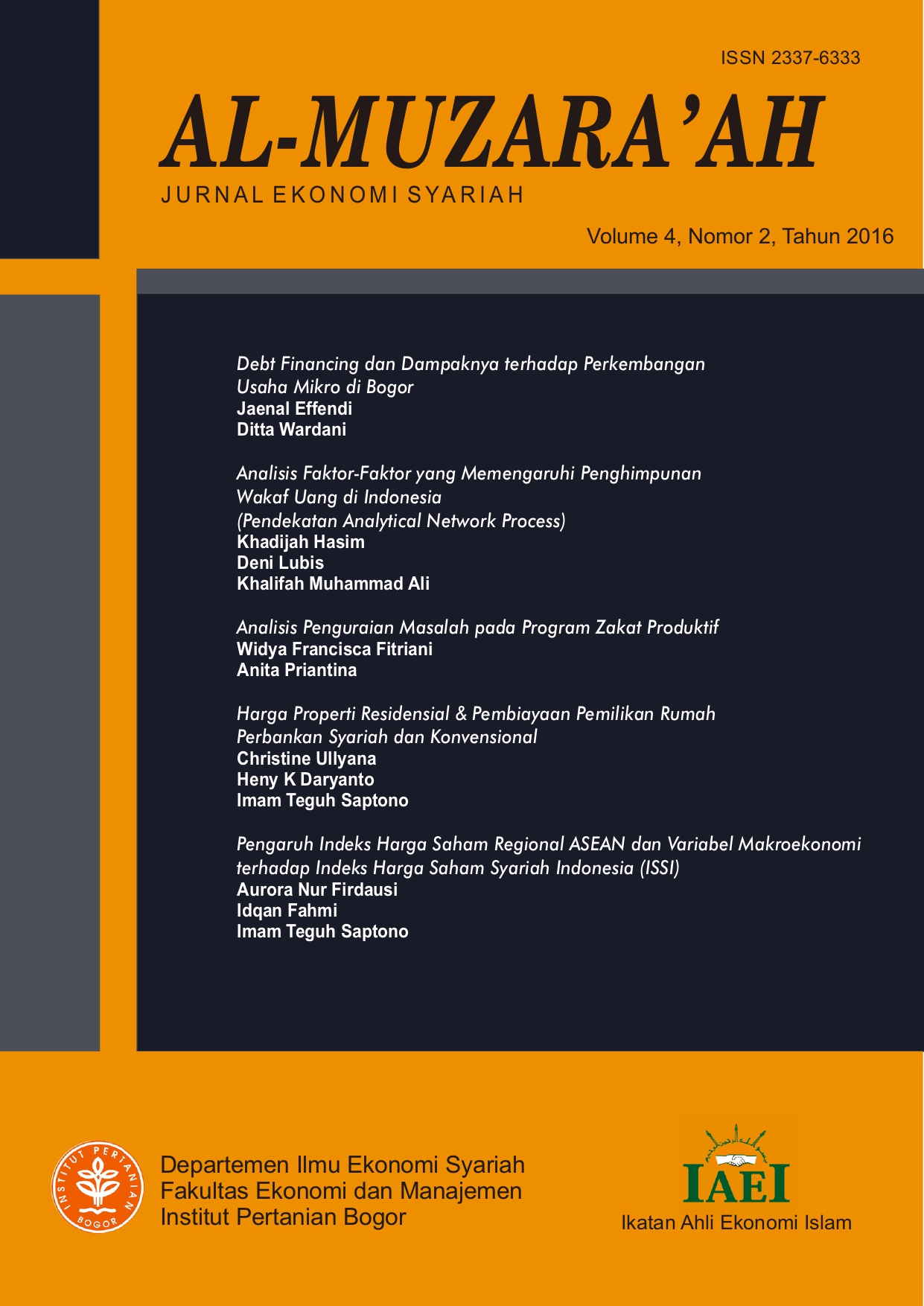Debt Financing dan Dampaknya terhadap Perkembangan Usaha Mikro di Bogor
Main Article Content
Abstract
Micro and small enterprises (MSEs) have an important role in supporting the national economy. Nevertheless, MSEs still have a major problem in its development, called limited capital. The presence of BPRS which is part of sharia financial institutions is expected to provide financing assistance for MSEs. The financing provided by BPRS is not only given in the form of equity financing but also in the form of debt financing. This study analyzes the effect of debt financing on MSEs development and also the factors influenceing the income and profit of MSEs after getting debt financing. The method used in this research is paired sample t test and Ordinary Least Square (OLS). The result of paired sample t test showed that the variable of earnings and profit of MSEs have significant change after getting financing. Furthermore, the result of analysis with OLS method showed that labor variable, amount of financing, profit rate, gender dummy, and education dummy have a significant effect to earnings and profit of MSEs
Downloads
Article Details

This work is licensed under a Creative Commons Attribution-ShareAlike 4.0 International License.
Author(s) who published in this journal agree to following terms:
- Authors understand and agree that copyright of manuscripts published are held by Al-Muzara'ah. The statement to release the copyright to Al-Muzara'ah is stated in form CTA (link doc).
- Copyright encompass exclusive rights to reproduce, to distribute, and to sell any part of the journal articles in all form and media.
This work is licensed under a Creative Commons Attribution-ShareAlike 4.0 International License (CC BY-SA) where Authors and Readers can copy and redistribute the material in any medium or format, as well as remix, transform, and build upon the material for any purpose, but they must give appropriate credit (cite to the article or content), provide a link to the license, and indicate if changes were made. If you remix, transform, or build upon the material, you must distribute your contributions under the same license as the original.
References
Akoten JE, Sawada Y, Otsuka K. 2006. The Determinants of Credit Access and Its Impact on Micro and Small Enterprises: The Case of Garment Producers in Kenya. Economic Development and Cultural Change Journal. 54(4): 927-943.
Anggraeni L, Puspitasari H, Ayubbi SE, Wiliasih R. 2015. Akses UMKM Terhadap Pembiayaan Mikro Syariah dan Dampaknya Terhadap Perkembangan Usaha: Kasus BMT Tadbiirul Ummah, Kabupaten Bogor. Jurnal al-Muzara’ah. Vol.1(1).
Ascarya. 2008. Akad dan Produk Bank Syariah. Jakarta(ID): Raja Grafindo Persada.
[BPRS Amanah Ummah]. 2016. Komposisi Pembiayaan BPRS Amanah Ummah Tahun Anggaran 2013-2015. Bogor(ID): BPRS Amanah Ummah.
Dewi G. 2007. Aspek-aspek Hukum dalam Perbankan dan Pengasuransian Syari’ah di Indonesia. Jakarta(ID): Kencana.
Hakim AA. 2011. Fiqih Perbankan Syariah Transformasi Fiqih Muamalah ke dalam Peraturan Perundang-Undangan. Bandung (ID): PT. Refika Aditama.
[KEMENKOP] Kementerian Koperasi dan Usaha Kecil dan Menengah. 2010. Undang-Undang Republik Indonesia Nomor 20 Tahun 2008 tentang Usaha Mikro, Kecil, dan Menengah. [katalog: Peraturan Undang-Undang tentang UMKM].
[KEMENKOP] Kementerian Koperasi dan Usaha Kecil dan Menengah. 2017. Perkembangan Data Usaha Mikro, Kecil, dan Menengah Tahun 2015, Unpublished..
Khan T, Ahmed H. 2001. Risk Management: An Analysis of Issues in Islamic Financial Industry. Islamic Research and Training Institute. 5(1). 61-79.
Kurniawan D. 2008. Uji T Berpasangan (Paired T-Test), Vienna (AT) : Foundation for Statistical Computing.
Muhammad. 2005. Bank Syariah Problem dan Prospek Perkembangan di Indonesia, Yogyakarta (ID): Graha Ilmu.
Nawawi I. 2012. Fikih Muamalah Klasik dan Kontemporer. Bogor (ID): Ghalia Indonesia.
[OJK] Otoritas Jasa Keuangan. 2016. Statistik Perbankan Syariah. Komposisi Pembiayaan yang Diberikan BPRS di Indonesia.
Rachman LH. 2014. Dampak Pembiayaan Syariah terhadap Profitabilitas Usaha Mikro pada Nasabah Bank Perkreditan Rakyat Syariah Harta Insan Karimah Kecamatan Ciledug Kota Tangerang. [skripsi]. Bogor (ID): Institut Pertanian Bogor.
Salamah SS. 2015. Analisis Pengaruh Pembiayaan Ijarah Terhadap Perkembangan UMKM (Studi Kasus BPR Syariah Amanah Ummah Leuwiliang Kabupaten Bogor). [skripsi]. Bogor (ID): Institut Pertanian Bogor.
Tambunan THT. 2009. UMKM di Indonesia, Jakarta (ID): Ghalia Indonesia.
Zuhaily W. 2001. Al-Fiqh Al-‘Islami wa ‘Adillatuh (Islamic Jurisprudence and Its Proofs). Damascus (SY): Dar Al-Fikr

